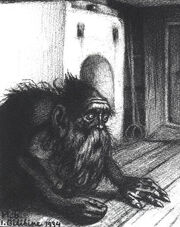
A Domovoi, or household spirit, found in the folklore of Eastern Europe. It is a survival belief from Slavic paganism.
A household deity is a deity or spirit that protects the home, looking after the entire household or certain key members. It has been a common belief in pagan religions as well as in folklore across many parts of the world.
Household deities fit into two types; firstly, a specific deity- typically a goddess- often referred to as a hearth goddess or domestic goddess who is associated with the home and hearth, with examples including the Greek Hestia and Norse Frigg.
The second type of household deities are those that are not one singular deity, but a type, or species of animistic deity, who usually have lesser powers than major deities. This type was common in the religions of antiquity, such as the Lares of ancient Roman religion, the Gashin of Korean shamanism, and Cofgodas of Anglo-Saxon paganism. These survived Christianisation as fairy-like creatures existing in folklore, such as the Anglo-Scottish Brownie and Slavic Domovoi.
Household deities were usually worshipped not in temples but in the home, where they would be represented by small idols (such as the teraphim of the Bible, often translated as "household gods" in Genesis 31:19 for example), amulets, paintings or reliefs. They could also be found on domestic objects, such as cosmetic articles in the case of Tawaret. The more prosperous houses might have a small shrine to the household god(s); the lararium served this purpose in the case of the Romans. The gods would be treated as members of the family and invited to join in meals, or be given offerings of food and drink.